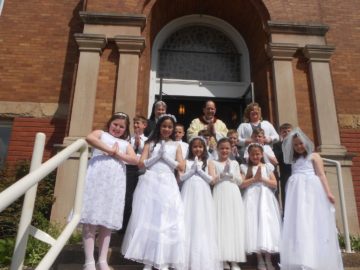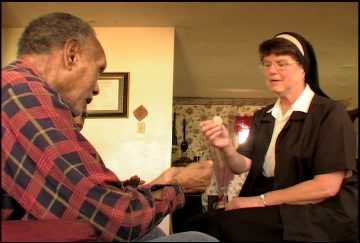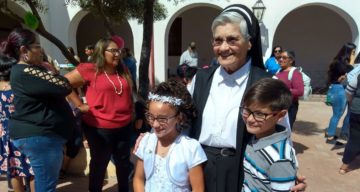As we celebrate the Solemnity of the Most Holy Body and Blood of Christ, Franciscan Friar Fr. Paul Gallagher reflects on the Gospel for Sunday June 12, 2022. The content is edited by Franciscan Sister of Christian Charity Sister Anne Marie Lom and Joe Thiel. The excerpts from the Sunday readings are prepared by Joe Thiel. To read or download the complete pdf with excerpts for your prayer, please click here: Franciscan Gospel Reflection June 19 2022 Excerpts are from the Lectionary for Mass for Use in the Dioceses of the United States of America, second typical edition © 2001, 1998, 1997, 1986, 1970 Confraternity of Christian Doctrine, Inc., Washington, DC. Used with permission. All rights reserved. No portion of this text may be reproduced by any means without permission in writing from the copyright owner.
Luke 9:11b-17
Jesus spoke to the crowds about the kingdom of God, and he healed those who needed to be cured. As day was drawing to a close, the Twelve approached him and said, “Dismiss the crowd so that they can go to the surrounding villages and farms and find lodging and provisions; for we are in a deserted place here.” He said to them, “Give them some food yourselves.” They replied, “Five loaves and two fish are all we have, unless we ourselves go and buy food for all these people.” Now the men there numbered about five thousand. Jesus said to his disciples, “Have them sit down in groups of about fifty.” They did so and made them all sit down. Then, taking the five loaves and the two fish, and looking up to heaven, he said the blessing over them, broke them, and gave them to the disciples to set before the crowd. They all ate and were satisfied. And when the leftover fragments were picked up, they filled twelve wicker baskets.
Background:
Luke describes this event as taking place in Bethsaida, a familiar place to Jesus and the disciples. It is a fishing village on the northeastern shore of Galilee and was the home of Philip, Andrew, and Peter. Jesus had cured a blind man here (Mark 8:22-26). Jesus is reported to have complained that the people of Bethsaida, as well as those of Chorazin, were slow to repent (Matthew 11:21), considering the signs of power that he had shown in their area. These people would have been familiar with Jesus and his ministry. This may explain the great crowds that gathered to hear Jesus speak about the Kingdom of God. If familiarity with Jesus did not draw the crowd, reports that he was “healing those who needed to be cured” would have done so. As the day nears its end and the time for the main meal of the day approaches, the twelve (with just five loaves and two fish) suggest that Jesus send the crowd away so that they can get provisions and secure lodging.
 This gospel text has many levels of significance for Luke’s community. They would be familiar with the stories from the Hebrew Scripture where God had acted to feed their ancestors. Most important would be the feeding with quail and manna during their time in the desert (Exodus 16:4-35). A story less familiar to the contemporary Christian is that of Elisha, a prophet, who was able to feed 100 people with 20 barley loaves.
This gospel text has many levels of significance for Luke’s community. They would be familiar with the stories from the Hebrew Scripture where God had acted to feed their ancestors. Most important would be the feeding with quail and manna during their time in the desert (Exodus 16:4-35). A story less familiar to the contemporary Christian is that of Elisha, a prophet, who was able to feed 100 people with 20 barley loaves.
“A man came from Baal-shalishah bringing the man of God twenty barley loaves made from the first-fruits, and fresh grain in the ear. Elisha said, ‘Give it to the people to eat.’ But his servant objected, ‘How can I set this before a hundred men?’ ‘Give it to the people to eat,’ Elisha insisted. ‘For thus says the Lord, they shall eat and there shall be some left over.’ And when they had eaten, there was some left over, as the Lord had said.” (2Kings 4:42-44)
With this background, Luke’s community would understand that Jesus was doing for them what God had done for their ancestors.
On yet another level, Luke has chosen to tell this story using language that would remind the community of their Eucharistic banquet. The sequence of the verbs in this text: “taking the loaves,” “said the blessing,” “broke them,” and “gave them to the disciples” (Luke 9:16) is identical to the text used by Luke at the Last Supper. “Then he took the bread, said the blessing, broke it, and gave it to them, saying, ‘this is my body, which will be given for you; do this in memory of me.’” (Luke 22:19) This language would remind the people of the Last Supper, the Eucharistic banquet, and the final banquet when the Kingdom of God is restored. This last notion is enhanced by the fact that Luke reports that “all were satisfied.” In fact, the context for this story is that Jesus was speaking about the Kingdom of God and healing those who were in need. (Luke 9:12)
Reflection Questions:
- What are your memories of favorite meals growing up?
- Have there been some banquets that have been memorable? What made them memorable?
- Do you have memories of being truly hungry? Have you ever been in the midst of people who typically do not have enough to eat? How does your experience of hunger affect how you hear this gospel?
 Can you recall passages in the scriptures that make reference to a heavenly banquet in some way?
Can you recall passages in the scriptures that make reference to a heavenly banquet in some way?- If you think of a gathering of five thousand in the countryside, hoping to be healed and to hear a religious teacher, what kind of people would you expect to find among the group? How would that be similar to or different from those you will gather with on Sunday to hear this gospel?
- Given Jesus’ complaint about the people of Bethsaida in Matthew 11:22, do you find it surprising that Jesus would perform such a sign of compassion for them?
- How often do you think those gathering there ever sat down to a meal where they could eat as much as they wanted and have leftovers besides?
- How do you think the disciples heard Jesus’ statement that they give the people some food themselves? Do you think that statement is important to the story? Is it important for you as you hear the story today?
- The apostles provide the bread and the fish, distribute it to those gathered, and collect the remainder. Does the fact that Jesus wants them involved in the feeding of the crowd have meaning for you?
- Jesus was healing the sick and teaching about the Kingdom of God when he told the disciples, “Give them some food yourselves.” How does this fact impact you?
- The last verse of the text says that the crowd ate until they were satisfied. Does God also desire for you to have enough so that you are satisfied? Do you think that God desires for those you will gather with to hear this text to be satisfied? What about all those who will not hear this text this Sunday for whatever reason?
- Can you talk with God about this feast and how this gospel might be shedding some light on this feast for you?



